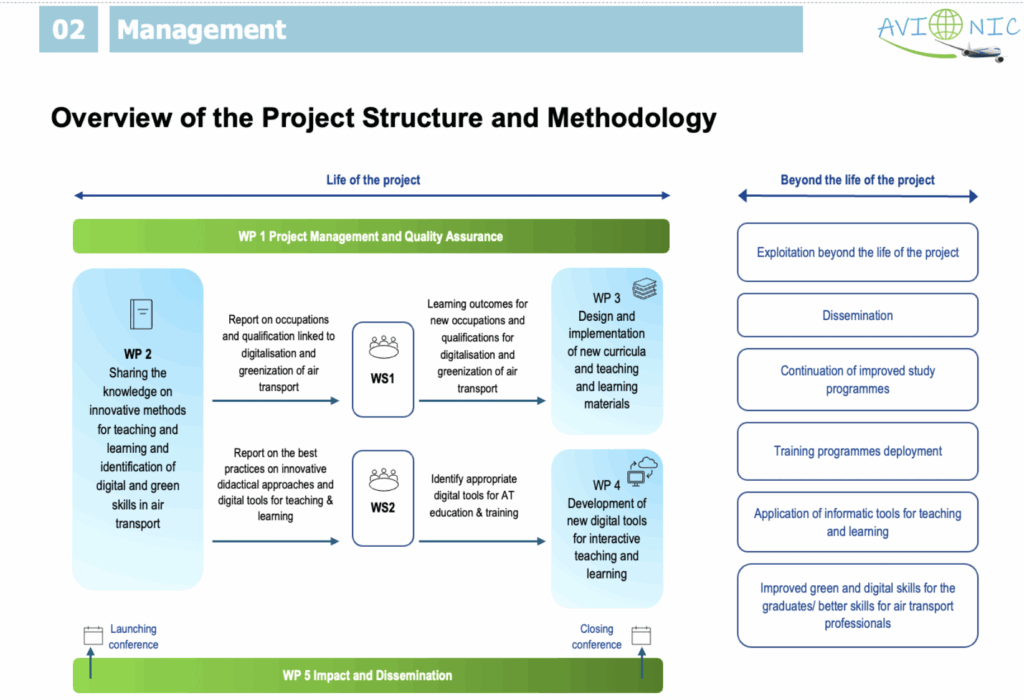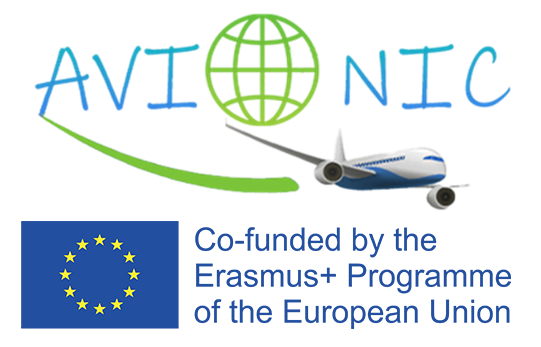
The AVIONIC project was structured around five interconnected Work Packages (WPs), each designed to advance innovation in teaching and learning for a greener and more digital aviation sector. Together, these WPs delivered concrete results that have strengthened higher education and industry collaboration.
WP1 ensured that the AVIONIC project was implemented smoothly and with consistent quality across all partner institutions. The focus was on strong coordination, transparent communication, and rigorous monitoring of progress. This foundation allowed all other Work Packages to reach their goals effectively.
Key achievements included:
· Establishing a clear governance structure, with defined roles for each partner.
· Regular partner meetings, both online and face-to-face, to monitor progress and align activities.
· A set of quality assurance tools and procedures, ensuring that all deliverables met the required standards.
· Timely reporting to the funding agency, demonstrating accountability and efficiency.
· Risk management processes that helped anticipate challenges and maintain steady progress.
As a result, WP1 created the framework for collaboration and trust that was essential for the project’s success.
WP2 provided the knowledge base for the project by identifying how digitalisation and sustainability trends were reshaping jobs in aviation and logistics. The partners investigated new occupations, emerging qualifications, and the competences needed for the green and digital transition.
Highlights of this work included:
· A comprehensive report mapping future skills needs in aviation, based on international studies and industry consultations.
· Identification of new occupations linked to smart technologies, green mobility, and digital tools.
· Alignment of findings with EU frameworks such as ESCO (European Skills, Competences, Qualifications and Occupations) and EQF (European Qualifications Framework).
· Documentation of innovative teaching methods, including case studies of best practices in higher education.
This research shaped the curriculum development work in WP3 and provided policymakers and educators with valuable evidence for future reforms.
Building on the results of WP2, WP3 focused on bringing innovation directly into higher education programmes. The aim was to modernise courses and curricula so that students gained the competences needed for tomorrow’s aviation sector.
Main achievements:
• Designing the updated learning outcome for 60 courses across 10 study programmes at partner universities.
• Integrating new modules on sustainable air transport, digital aviation tools, and smart logistics.
• Testing the new materials with students during pilot courses, ensuring relevance and usability.
• Involving industry representatives in curriculum design to guarantee alignment with labour market needs.
• Producing guidelines for educators on how to replicate these updates in other programmes.
The work in WP3 directly supported the modernisation of higher education, bridging the gap between academia and the rapidly evolving aviation industry.
WP4 was dedicated to the creation of new digital tools that made learning in aviation more interactive, engaging, and future oriented. This Work Package focused on the development of the e-Avionic platform, designed as an open, accessible, and flexible digital resource for teachers and students.
Achievements included:
· Development of the e-Avionic OER platform, offering interactive learning modules and resources.
· Integration of simulators, games, and 3D visualisation tools to make aviation education more practical.
· Ensuring accessibility and multilingual options, making the platform inclusive and adaptable.
o Access the platform here – https://avioniclearn.upb.ro/
· Pilot testing with students and teachers in Romania, Spain, and France, with excellent feedback.
· Providing a sustainable model for digital teaching in aviation, adaptable to other fields.
By combining advanced digital tools with pedagogical innovation, WP4 created a long-term resource that continues to support green and digital skills in aviation education.
The results of the AVIONIC project were not confined to partner institutions – they were actively shared with a wide range of stakeholders to ensure long-term impact. WP5 focused on dissemination, exploitation, and sustainability.
Key achievements:
• Launch of the official project website and social media channels, reaching thousands of visitors. Read more here
• Publication of newsletters, press releases, and project updates that kept stakeholders informed.Please see the “Publications” section
• Organisation of multiplier events, including international conferences and workshops, with strong participation from academia, industry, and policymakers. Check details and pictures on our Events page
§ More details on events and dissemination activities can be found here: Events
• Dissemination, Exploitation and Sustainability Plan (DESP) to guide the use of results beyond the project’s lifetime.
• Strengthening links with European and international networks to maximise visibility and adoption.
Through WP5, AVIONIC achieved strong visibility, ensured long-term use of its outputs, and positioned itself as a reference for innovative teaching in aviation
